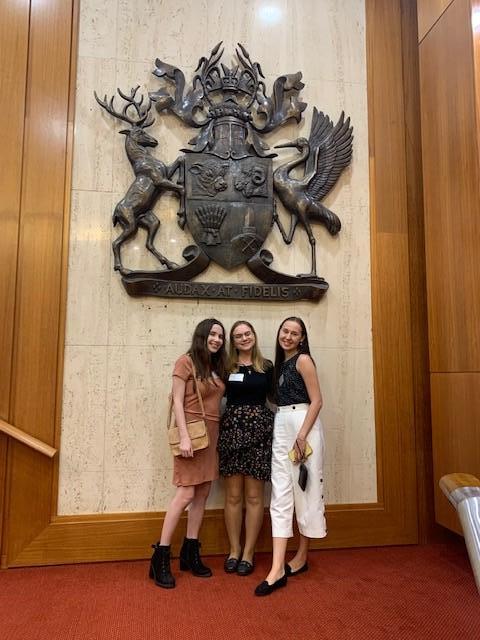Through partnerships with several community organisations, UQ Pro Bono Centre students have been researching the benefits and potential problems of criminalising coercive control, with an emphasis on how such legislation will affect women. The research projects have investigated the practical implications of making coercive control a criminal offence, and whether there are recommended practices from other jurisdictions for identifying and responding to instances of coercive control. The students have produced literature reviews and position papers, which will be used by the community organisations for further research and consultations, taskforce submissions and ongoing advocacy activities.
As a result of their dedicated work for state-wide peak body Ending Violence Against Women Queensland, law students Ailis Rogers, Nina Sarapa and Sophie James were recently invited to attend the Queensland Coercive Control Network Dinner at the Queensland Parliament. Queensland government representatives, taskforce members, poet and author Anisa Nandaula, and award-winning journalist Jess Hill were in attendance.
“It was an honour to be in a room full of such passionate and committed women advocates. Their speeches, stories and poetry were inspirational and I was proud that we were able to contribute to these important law reform efforts.” - Nina Sarapa

Driving change for issues of domestic and family violence
Women’s rights are an important focus for the Centre, and projects addressing issues of family and domestic violence are of significant interest to our law students.
In the past year alone, the UQ Pro Bono Centre has produced seven research reports on issues of domestic and family violence for a range of community organisations in the Brisbane area. Examples include:
- An investigation into whether a separate criminal offence should be introduced in Queensland to cover situations where victims have been doused in petrol and threatened with violence.
- A literature review exploring the prevalence of domestic and family violence amongst employees in social and community services.
- A law reform submission in response to the Criminal Code (Choking in Domestic Settings) and Another Act Amendment Bill 2020 recommending several amendments and the inclusion of the offence in the serious violent offences schedule.
- An analysis of the over-representation of culturally and linguistically diverse (CALD) women who are named as respondents or subject to cross-applications for protection orders in situations of domestic and family violence.
Read more of the Pro Bono Centre’s publications here: https://law.uq.edu.au/pro-bono/publications.



